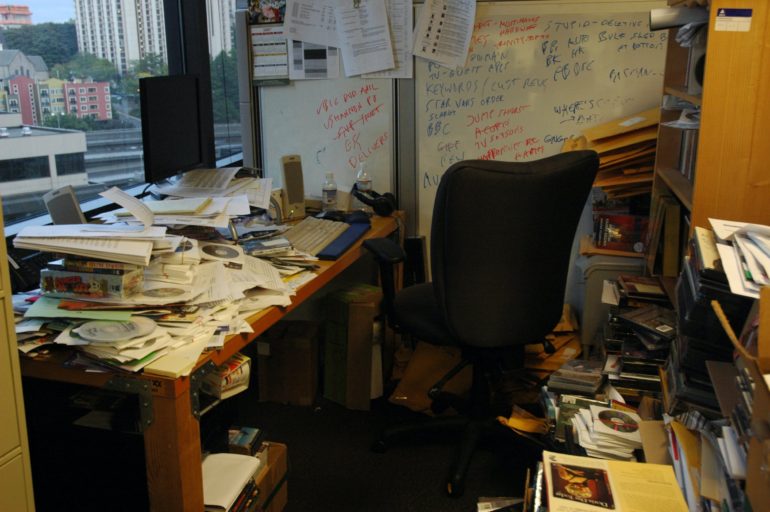(revised)
Picture this. You’ve just left the kitchen after dinner clean up and you’re looking forward to some mindless television watching as a way of winding down after a long day. As you walk past the dining room, your mood shifts suddenly as that darn pile of papers glares at you as if to say “another day gone by and still I sit here, unattended.” You consider pausing for a moment to sort through the pile that has been building over the weeks, but you know that it will take far more than a moment to tackle it. So, you move past the dining room and into the living room and head for the couch. You fixate your eyes on the television set and block out what you know still needs to be taken care of – until the next time you walk past the dining room.
Most every person can relate to at least three things about clutter – its inevitability, how quickly it builds and how long it remains untouched. Often, it’s the anticipation of attending to the growing pile that turns us off. It’s knowing that we have to set aside several hours of precious, often unavailable spare time to sort through clutter that we have to find an organized home for. However, once we begin, it never seems to be as arduous a task as we imagine. In fact, the process and certainly the end results, are so freeing and invigorating, that it’s definitely worth the effort.
Clutter appears not just in the form of piles of neatly (or not so neatly) stacked papers. It also appears in mounds in garages too crowded to even accommodate a car. It appears in the hallway as a dumping ground for kid’s knapsacks, lunch bags and coats at the end of the day. It appears in the form of uncatalogued photographs, clothes that are torn or outdated but too beloved to part with and sentimental but unnecessary gadgets in drawers throughout the house.
For some, clutter is comforting. In fact, some people hoard to perfection, may be obsessed with collections and may not be bothered by the never ending piles of paper. For most, clutter in one’s home or office is synonymous with clutter in one’s head. Most people feel emotionally lighter and can breathe easier when things are in order, when the old and unnecessary have been thrown or given away, when gadgets are organized and easy to find.
Take a look at the entrance to your home. Reflect on how you feel as you enter. Does your mood change? Do you feel like you can move through your entrance freely? Are you bogged down with angry thoughts such as “I’ve told the kids a million times to hang their coats up when they come home.” A client once shared and upon reflection, realized how she felt when she arrived home each day to see an old rolled up carpet in her front hallway. She had good intentions to take it to the curb but hadn’t gotten around to it. Each day created more and more frustration. When she came to see me, she talked about feeling angry when she arrived home but didn’t know why. She didn’t realize how seeing the carpet there was affecting her mood. Once she called on her neighbour for physical help and moved the old carpet out, she felt a large weight lifted from her shoulders. She was surprised at how great an effect it had on her and shared that she no longer felt angry on her return home.
Similarly, one may not recognize clutter as the cause of their depressed mood. At some point, as the piles grow higher, so might one’s feeling of being out of control. It is important to recognize the impact that the feeling of a lack of control in one’s environment has on one’s mental health. Once you begin to tackle clutter, you will feel a greater sense of control over your possessions and piles of paper rather than feeling that those inanimate objects have control over you.
By the way, keep in mind that even if you stack piles behind sofas and inside bedroom closets, you will still know that they are there and will still be affected. In her book, “No More Clutter,” UK based Psychologist Sue Kay writes “while you may think out of sight is out of mind, things you hold on to take up mental space. At some unconscious level you know that all the junk behind the sofa is waiting to be dealt with.”
There is no time like the present. Open your windows and enjoy the Spring breeze as you climb out of your winter cocoon. After all your tidying and organizing, you’ll not only welcome the warmer weather, but even coming back indoors will feel like a breath of fresh air.
